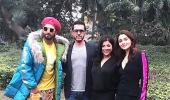'People now recognise rapping as a profession.'
'We are able to tell our relatives that we rap for a living.'

Zoya Akhtar's Gully Boy opened doors to never-seen-before opportunities for local artists, propelling many of them to stardom.
Rappers Chaitanya Sharma, who goes by the moniker SlowCheeta, and Dhaval Parab aka D'Evil, who were part of Gully Boy, credit the Ranveer Singh starrer for making hip-hop music 'Cool' in India.
The Mumbai-based rappers came together recently to launch a new single 90's Ke Ladke, a loving ode to a bygone era.
In a chat with Mayur Sanap/Rediff.com, SlowCheeta and D'Evil share, "If you don't go through struggles, you don't really have much to say. Hip hop is one art form through which an artist can truly express themselves, whether it is anger or happiness or any other emotion."
What was the inspiration behind this song?
Chaitanya: I liked the beat very much when I first heard it from (Producer) Ink Heart.
When I wrote the first verse, I thought it should have two singers. For a song like this, my pitch was just too high, so I needed someone to sing it with me to bring the contrast.
That's how I approached Dhaval who raps so efficiently with his baritone. He absolutely killed it here.
Dhaval" (Interrupts and quips) Sir, what is baritone?
Chaitanya: Baritone is something that you thrive on. It is your superpower.
Tell us about your creative partnership.
Dhaval: Ours is a very casual process. We work while doing lots of masti together. (For this song) We imbibed the vibes of the '90s and had lots of fun. This energy just translated into a song during the recording.
Chaitanya: No changes were made during the recording.
The first verse he wrote was a banger and we retained it.
The main thing for us is to have fun while working and I always have a blast with him.

How did Gully Boy change the scenario for hip-hop artists?
Dhaval: As you can guess from our clothes, a lot has changed! (Laughs)
Chaitanya: Thanks to that film, there is a lot of money coming into the industry and we are getting recognition through more films and advertisements. This was not the case before.
In India, Bollywood and cricket have an unparalleled reach.
A lot of people now can think of pursuing rap as career; it's no more just a hobby. It is a cool thing now.
Dhaval: People now recognise rapping as a profession.
We are able to tell our relatives that we rap for a living. They have started taking us seriously.
What were your struggles before this shift happened?
Dhaval: There was only one struggle: How to tell people what we do for a living.
I knew one thing, that even if I didn't continue with hip hop, I would still sustain myself because the art form has taught me a lot.
For example, I learned how to write creatively, be it a song, script, story, or ad.
I used to work as a copywriter before. It was possible because of my talent as a hip-hop artist.
People like me were doubtful about how long we can go with hip hop in this country.
Luckily, things started changing for us some years ago.
Divine (Vivian Wilson Fernandes, the rapper) was picked up by Sony Music. Even Zoya (Akhtar) had started spotting talents within the rapping industry (for Gully Boy).
When half of that film was made, a huge market had started opening up for us. Everybody wanted to experiment with hip hop.
Chaitanya: I feel if you don't go through struggles, you don't really have much to say.
Hip hop is one art form through which an artist can truly express themselves, whether it is anger or happiness or any other emotion.
In that sense, your struggle is actually your biggest gift.
Watch Chaitanya and Dhaval explain how they came to call themselves SlowCheeta and D'Evil
What's your process to understand the pulse of your audience?
Dhaval: I do not think about it.
The only thing is that the masses should be able to dance to my songs. It should really connect with them.
I don't make songs based on the latest trends.
What I feel in that moment, I put in my work and then hope that people will like it.
Chaitanya: You need to trust your instincts while making a song. I pay a lot of attention to the hook which makes people listen to the song. This is very important to me.
Dhaval: (The hook is) Something that people get hooked to and sing along with us, basically.

Chaitanya, does Shweta contribute to your creative process?
Chaitanya: She has been my first audience for every piece of music that I have created so far. She always shares her input.
Dhaval: Isliye toh itna accha music banta hain iska! (That's why his music is so good!)
(Both laugh.)
Chaitanya: She doesn't understand the technicalities of it, but she knows the pulse.
She tells me, 'This doesn't sound like you' or 'This isn't working' and I make changes according to her opinion. Her inputs are very important to me.
Watch Chaitanya and Dhaval perform 90's Ke Ladke










